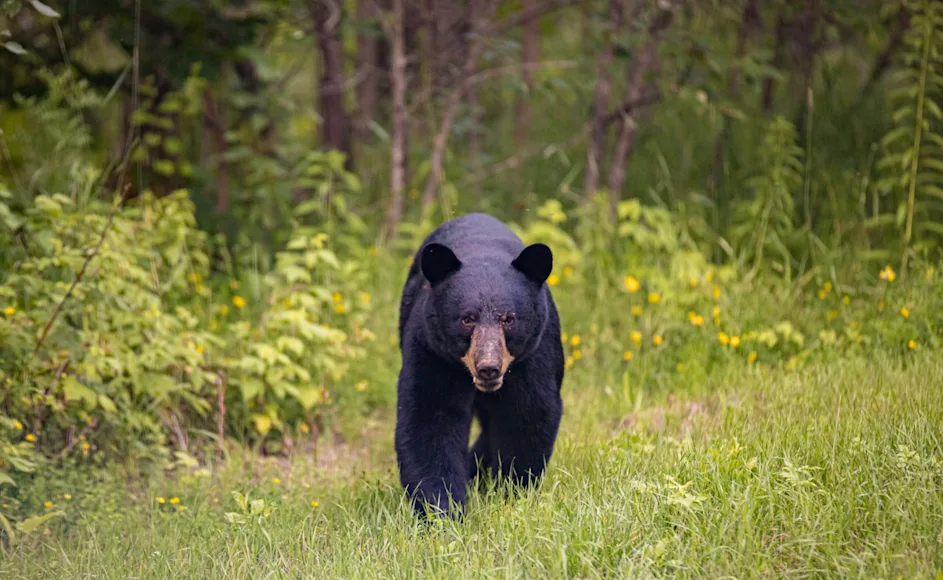Knowing how to survive a bear attack is a skill you never want to use. The first time I saw a grizzly bear’s tracks was a life-changing experience. I was fishing in Alaska and stepped on one by accident. The track was massive, and I knew right then and there that I had zero desire to be out there without more knowledge of them.
Every year, countless outdoor enthusiasts head into the great outdoors, pursuing adventure. Risks are involved, which is part of the draw for many of us. Among the beauty of our natural world lurk potential dangers. One such danger, often both feared and misunderstood, is the bear. The thought of crossing paths with these creatures can be terrifying. It was for me back then, but not now. With the proper knowledge and preparation, you can confidently navigate bear country. This guide on how to survive a bear attack will delve into what you should do if you see a bear, how to prevent unwanted encounters, and critical actions to take during an encounter or attack.
How to Survive a Bear Attack
The first thing to know about how to survive a bear attack is understanding the differences between black bears
and brown bears. Some methods are the same, but also a few differences that matter. Both bears can be aggressive, but black bears are more timid than browns. Your response at a distance is nearly the same for both, but you, up close, are different.
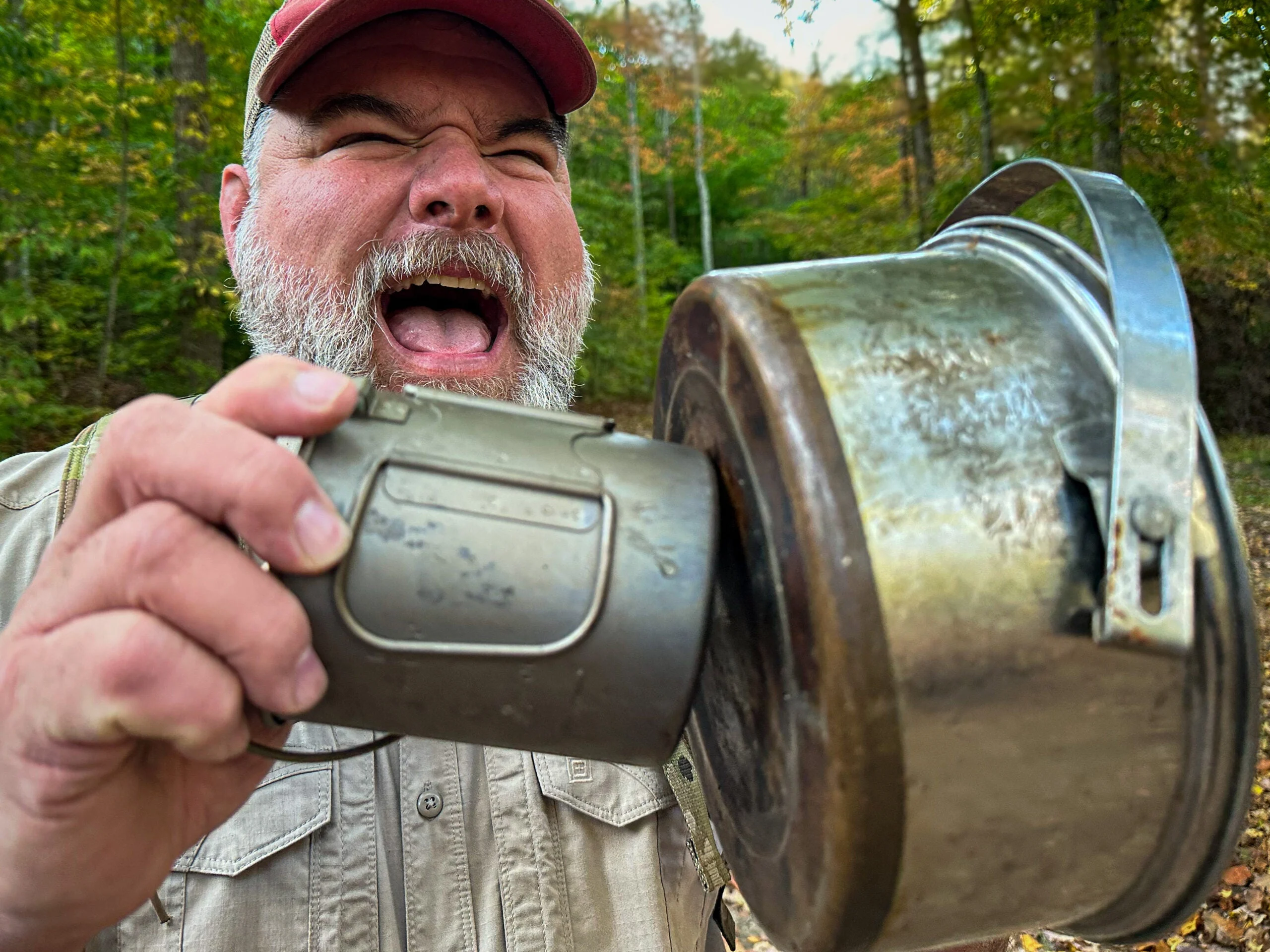
Want to avoid a bear attack? Then MAKE SOME NOISE! Jennifer Caudill
How to Avoid a Bear Attack
Travel in Groups
Bears are less likely to approach larger groups of people. It is given that in most situations, the bear will be aware that you are there long before you know they are there. When traveling in groups, you look like a more formidable adversary than you do if you are solo. This also allows your group members to have more “eyes on” your surroundings. You will be more likely to see a bear and avoid it whenever possible.
Make Noise
Talking, singing, or using bear bells can alert bears to your presence and prevent surprise encounters. A firm whistle is another excellent piece of equipment on your pack straps and is easy to get to. Blow it occasionally with a thick brush or whenever you see a bear sign. If the bear is in the area, this alerts them that you are there. Although bears are predators, they do not regularly hunt humans. If they know you are there, they will most often leave. At camp, you can beat cups and pans together to make noise that travels far.
Don’t Temp Bears with Food
Use bear-proof containers and store them away from your campsite. Bears have a perfect sense of smell and work at great distances. Low-end estimates are that bears can smell 1-3 miles away from many odors. Some studies show they can smell some of the more pungent odors as far as 15 miles away. Putting your food in a container can keep the smell down. Since they are opportunistic feeders, they may deal with the possibility of running into you to get your food. Also, be aware of dead animals or bear food cache sites. Anytime you see this, do not find yourself between a bear and its food. They can smell you while smelling their food, which will threaten their food source, and they will come and investigate.
Avoid Dawn and Dusk
These are times when bears are most active. If hiking, consider midday routes whenever possible. This also is a difficult time for you to see clearly. You want all your senses active in the outdoors when possible.
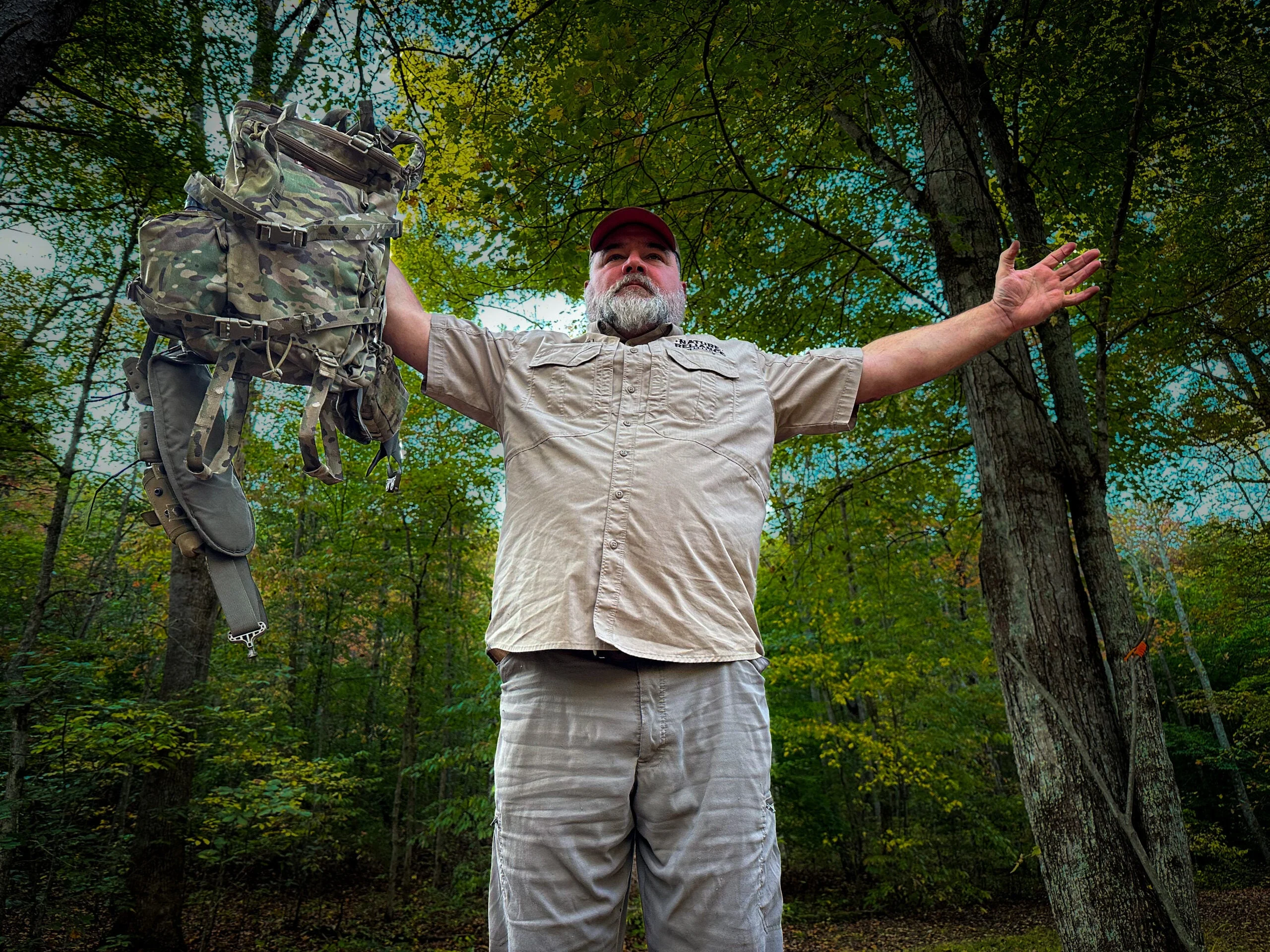
If you encounter a bear, stand your ground and your arms out wide to make you appear more significant than you are. Jennifer Caudill
What to Do If You See a Bear to Avoid a Bear Attack
Stay Calm
Panicking can make the bear-attack situation worse. Talk to the bear in a calm and firm voice. Your tone speaks volumes and can at least make a bear aware of your presence. This is another reason to hike in groups. Your conversation on the trail might be the thing that keeps you safe. If you are hunting, you must be hyper-vigilant since you purposely stay quiet most of the time.
Don’t Make Eye Contact
This can be seen as a sign of aggression or challenge. If you purposely look to the left or right of the bear, you can still see them without giving off any threatening signals.
Back Away Slowly
Never turn your back on or run from a bear. This can trigger its chase instinct. Bears will most likely leave if they know you are in the area. However, if this instinct is triggered, they may come after you.
Ready Your Bear Spray
If you have bear spray, prepare to use it in case the bear approaches. Bear spray is the best weapon you have in knowing how to survive a bear attack. Most bear sprays have an attachment point on your belt or pack straps. You should practice removing it from those areas just like a firearm. You don’t want to be under heavy stress and have difficulty getting it off your pack. The only way around that is to train with it.
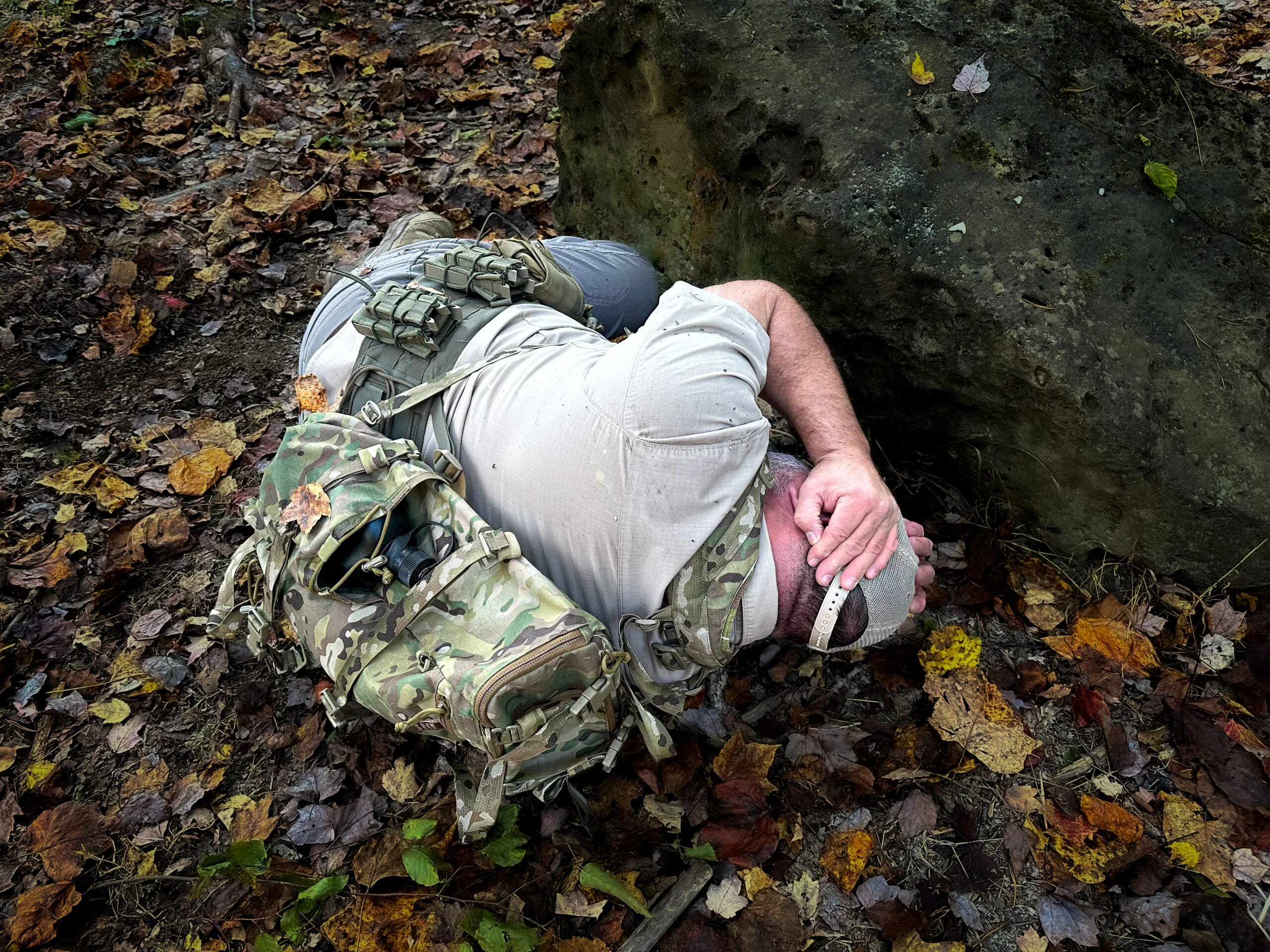
Playing dead is the best defense against a grizzly bear. Jennifer Caudill
What to Do During an Encounter
Identify the Type of Bear
Grizzly bears and black bears require slightly different responses when learning how to survive a bear attack. It is not just coloration that clues you in as to the kind of bear. Brown bears have a distinct shoulder hump and rounded ears. Black bears lack a pronounced shoulder hump and have pointier ears.
Speak Calmly
Let the bear know you are human and not a threat. Screaming can be misunderstood by many wild animals as aggression. These animals are large, so they can attack and will most likely win. Your goal in learning how to survive a bear attack is to give them a reason to leave before that occurs.
Stand Your Ground
Hold your position and speak louder if the bear approaches. If you have bear spray, this is the time to use it. Spread your arms out wide or stand on a rock to make you appear more significant than you are. Hold a pack over your head or side to do the same.
Avoid Sudden Movements
This can provoke the bear or be perceived as a threat. Running away is never a good idea at this time in your encounter.
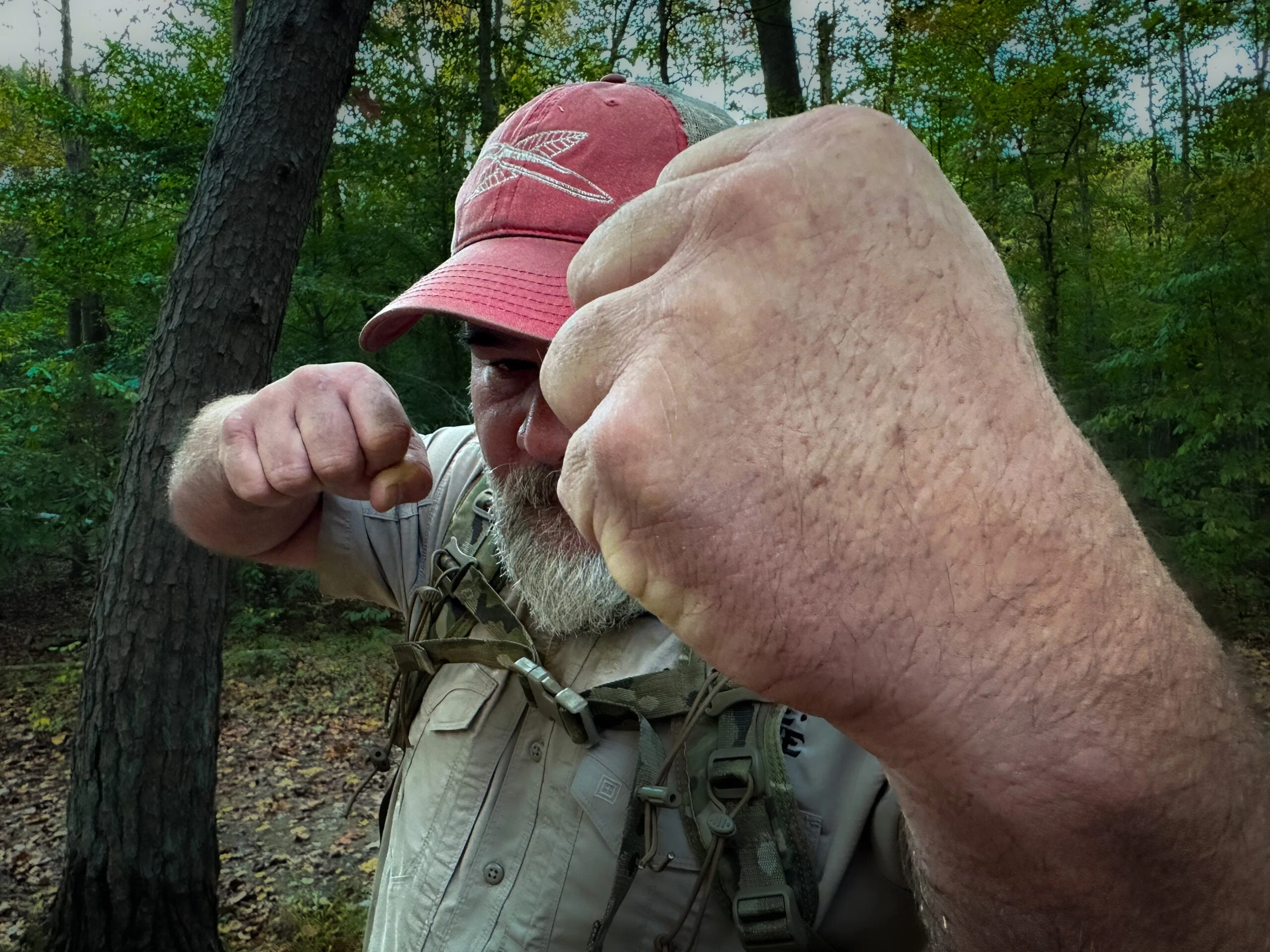
If a black bear charges, try to stand your ground and fight back. Jennifer Caudill
What to Do During a Bear Attack
Use Bear Spray
If you haven’t already, deploy your bear spray
. Studies have shown that knowing [how to use bear spray](http://If you haven't already, deploy your bear spray. Studies have shown that bear spray is likely more effective than a firearm. As one of my shooting instructors once said, “You need to understand we all have timers and switches.” Shooting with a firearm puts you on a timer with the animal unless you make a perfect shot into the spine or cranial cavity. Since that is unlikely, the spray stream from your canister is more likely to hit its mark. Once it makes contact with the eyes or mouth, it hits one of those switches to incapacitate the bear.)
is likely more effective than a firearm. As one of my shooting instructors once said, “You need to understand we all have timers and switches.” Shooting with a firearm puts you on a timer with the animal unless you make a perfect shot into the spine or cranial cavity. Since that is unlikely, the spray stream from your canister is more likely to hit its mark. Once it makes contact with the eyes or mouth, it hits one of those switches to incapacitate the bear.
**Read Next: The Best Bear Sprays
**
How to Survive a Bear Attack with a Grizzly? Play Dead
Lay in the fetal position to cover as many vital areas as possible. Cover your spine and neck with arms and hands as well. If you have a pack, keep it on to protect your spine. Remain as still as possible until the bear leaves the area.
How to Survive a Bear Attack with a Black Bear? Fight Back
Want to know how to survive a bear attack vs. a black bear? Use any available tool or your bare hands to hit the bear’s sensitive areas like the eyes or nose. This will often work since they are more timid than their brown counterparts. However, this is a last-resort sort of situation—one in which the bear has come toward you, or you have surprisingly come face to face with it for some reason. Use your fists, and don’t turn the inside of your arms toward the bear. If it takes a swipe or bite on you, you are offering ready access to your arteries and veins on the other side. The muscles and bones of your arms protect those if you put them toward the bear.
Apply First Aid
You should always go to the wilderness with good first aid training. Also, seek advanced trauma medicine training like “Stop the Bleed.” This will include using hemostatic gauze, tourniquets, and similar first aid supplies. If you are caught in an attack, you will want this training. It would be better to get this training and never need it than to watch someone you care for or yourself bleed to death in a preventable first-aid situation.
Get to Safety
Once the attack is over, seek medical attention and report the attack to local authorities.
FAQs
Can a human survive a bear attack?
Absolutely. While bear attacks are infrequent, many individuals have survived encounters using appropriate safety techniques and understanding bear behavior. Preparedness and education are crucial.
What should I do if a bear attacks me?
Your response will depend on the type of bear. With grizzlies, it’s often best to play dead. If it’s a black bear, try to fight back, targeting the eyes and nose. Bear spray is vital in all scenarios if you have it on hand.
How do you scare off a bear attack?
Bear spray is the most effective deterrent. Speaking in a firm, loud voice and making yourself appear larger by raising your arms can also help. If in a group, stand together to appear more imposing.

